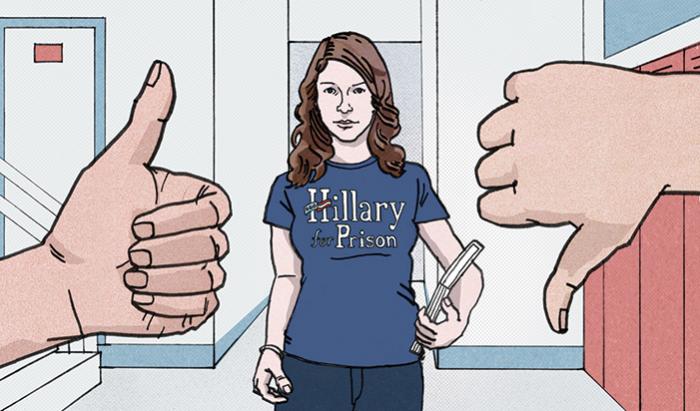Q: A student came in with a “Hillary for Prison” T-shirt, and I suggested it might be inappropriate for school. My administrator told the student that political statements on clothing are allowed, but our dress code says students may not wear clothing that “ridicules a person or a group.” How do I talk to my administrator about why this is wrong?
The Supreme Court has usually upheld the First Amendment rights of students to wear message T-shirts in schools. As a general matter, the school may not censor the expression unless the message substantially interferes with school operations or invades somebody’s rights (to privacy, for example). T-shirts like this are considered political speech, and the “Hillary for Prison” shirt is likely protected. Therefore, there are no grounds for the school to intervene.
Instead of advocating for enforcement of the school policy, use this situation as a teachable moment to talk about our judicial system and civil discourse. Engage students in a discussion about the value of focusing on policies rather than vilifying political candidates. While some politicians and citizens have played dirty politics, students do not have to do that.
Q: I teach a social ethics course and a world religions course, and I constantly have students who derail the class with their rejection of the material. Do you have strategies to help ease the classroom tensions and build a better rapport with these students?
Start off the semester by letting students know that you realize they may be uncomfortable with some of the topics and may disagree with some of the perspectives you present. This is a great opportunity for building intellectual curiosity and understanding about other points of view. From there, you can begin building an intellectually safe community of inquiry through a class contract and group discussion. Help students establish a standard that all participants of the classroom community can ask any question and state any point of view as long as they are respectful of their classmates.
It’s also important to make sure you’ve cultivated a positive classroom climate and fostered community before you start heavy conversations. Our guide Let’s Talk! Discussing Race, Racism and Other Difficult Topics With Students is a great tool for preparing yourself and your students for such discussions. Also, check out our 20 Face to Face Advisories for activities that fuse anti-bias education and high student engagement. Building a sense of camaraderie with your class can help make challenging discussions easier to dive into.
Finally, talk with these disruptive students privately, and invite their honest feedback on the class and your teaching. Reflecting on their evaluations can help you become a more effective educator.


0 COMMENTS